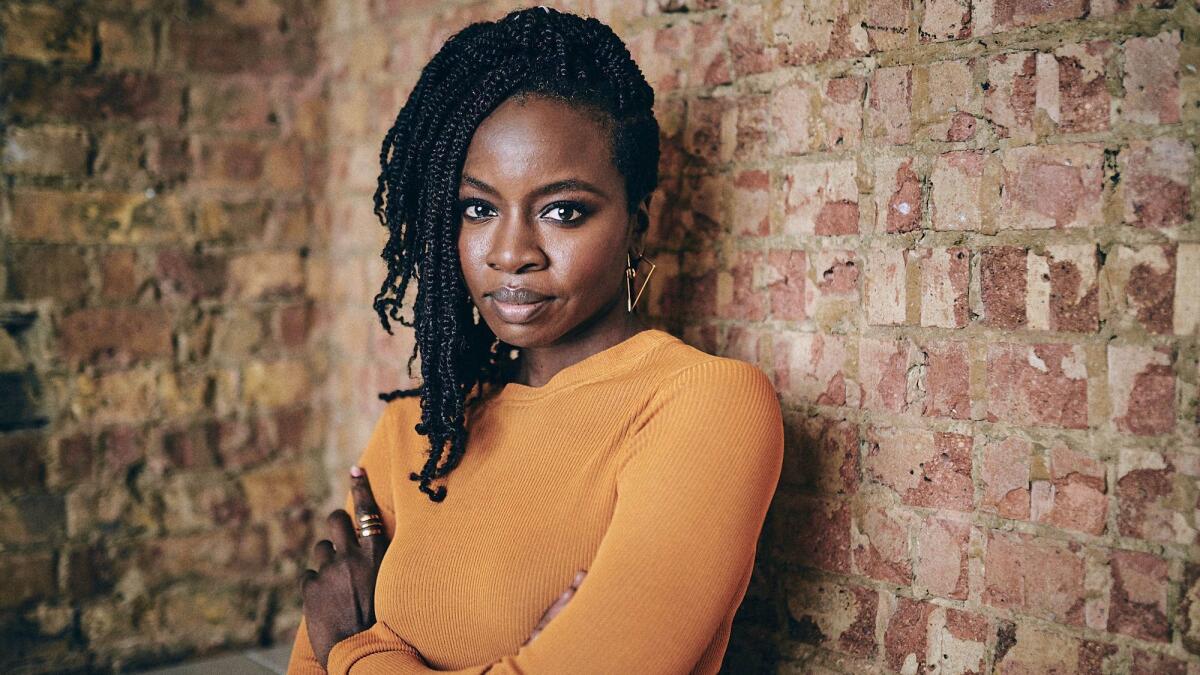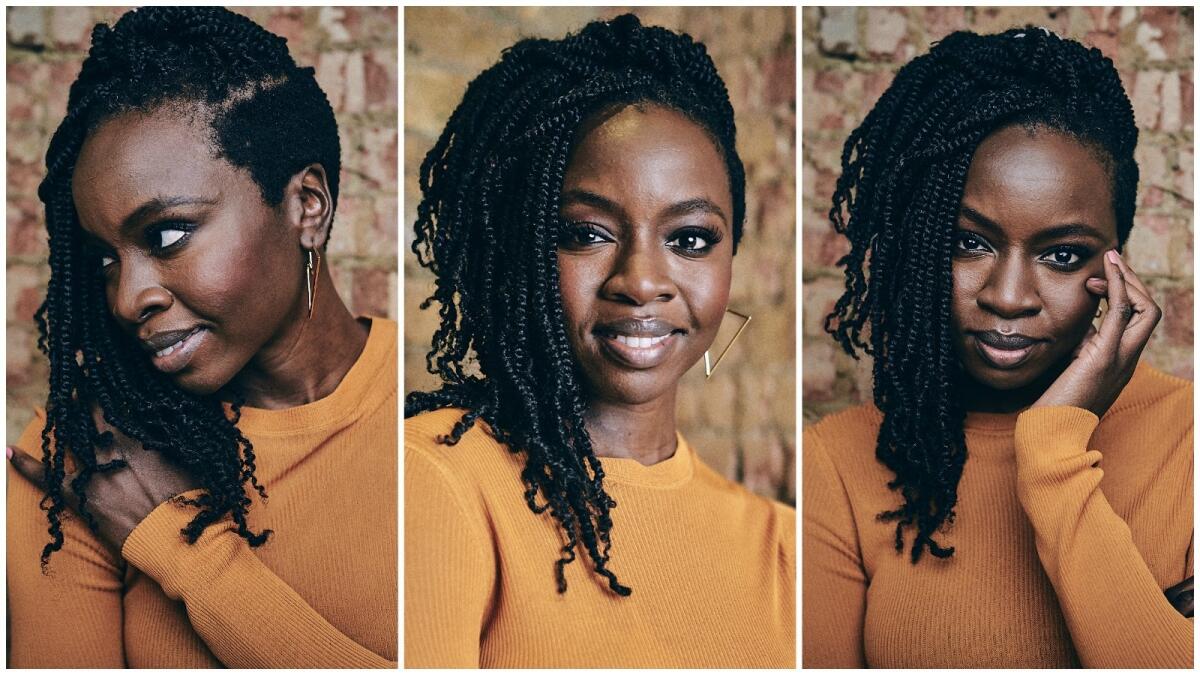Danai Gurira says her post-’Black Panther’ calling is to return to writing, but with one key twist

LONDON — Despite the towering success of “Black Panther” and “The Walking Dead,” Danai Gurira, the actress, is steadfastly holding onto her alternate identity: Danai Gurira, the writer.
Gurira, whose plays grapple with cultural identity and her heritage as a Zimbabwean and an American, recently opened her 2012 “The Convert” at London’s Young Vic, with “Black Panther” costar Letitia Wright in the lead role. The play, which Gurira calls “something I deeply needed,” is set in colonial Zimbabwe in 1896 and reflects on the period solely from the African perspective, with no white characters on the stage. In this version, directed by Ola Ince, the story unfolds in the round with sparse, stylized sets that bring even greater drama to the narrative.
That’s just one of several Gurira plays onstage around the world. Her 2015 “Familiar” is playing at Chicago’s Steppenwolf, and another production of “Familiar” will open at San Diego’s Old Globe on Jan. 26.
Gurira remains busy in Hollywood too. Her “Black Panther” character, Okoye, is likely to return in next year’s “Avengers: Endgame,” and she is adapting Chimamanda Ngozi Adichie’s “Americanah” into a miniseries starring Lupita Nyong’o. The playwright, actress and now Goodwill Ambassador for UN Women took a few days to fly in for the opening of “The Convert” in London, where she sat down to discuss the production, her career and why onscreen representation is essential for people of color.
Have your plays been performed in London?
This play has been done at the Gate, which also did “Eclipsed” — which Letitia was in as the lead role. I didn’t work with her too much with “Eclipsed.” I came in for a few days for that one, but I couldn’t get back to watch a performance. So I got to know her a little bit then, but not as much as I did during “Black Panther.” At this point, we have a shorthand with each other for many things.
Did you have say in her casting in this production?
Yes, in the sense that it was very much something [Young Vic Artistic Director] Kwame [Kwei-Armah] thought of immediately. I was completely in love with the idea.
What was driving you when you wrote “The Convert”?
Where is the history of my people told from our perspective on the screen or on the stage? Where is our experience of the colonial impact and assault? And who would I have been if I’d been born 150 years ago and what journey would I have trekked?
A lot of those questions were at the fore. I grew up in a British colony, in Zimbabwe, when it was a young ex-colony. It was very much a British schooling system, and I was taught very little about the land I was living on.
I left Zimbabwe and came to the United States for university, and in liberal arts colleges, you’re allowed to start thinking about, “Who are my people? Who am I? What’s our history?” And start to really explore that in a way that’s necessary for your own journey. And I think it’s even necessary for the Brits, quite honestly. Their history doesn’t seem to involve those who were colonized, in how it’s assessed. So it is exciting for me to see this play performed in front of a British audience.

People say, ‘Oh, it’s political.’ But it’s not political. It’s my people.
— Danai Gurira
Do you write plays to offer new perspectives?
I guess they are new, but for me, they’re just me. They’re perspectives from my people, who are often the ones marginalized and underrepresented or misrepresented. So it really is about, “Can I explore another angle of humanity that hasn’t been represented?” It’s the other-ized perspective. That’s what I do. People say, “Oh, it’s political.” But it’s not political. It’s my people. It gets other-ized, and that’s the thing I’m aiming to obliterate. Or, at least, to provoke another understanding.
Are you writing new plays?
Right now, I’ve been focused on writing for the screen. I’ve been very involved in the plays I already have created. I’ve been involved in their various productions. I’m constantly connected to productions, but in terms of writing, my writing right now is for the screen. But that doesn’t mean it’s not going to be for the stage as well. It’s just not what I’m doing right now, which is an important step for me because I’ve had a burden on my heart for a long time to put these types of characters on the screen.
How are you feeling about the appreciation for “Black Panther” and how those characters that were brought to the screen?
It’s been deeply nourishing. And more so than we could have been anticipated or expected. We definitely put all our heart and soul into it. We were seeking the most authentic, the most truthful, the most alive, the most connected version of the story we could all tell. And the beauty was that was a collective perspective. It was deeply rooted in Ryan [Coogler], but it wasn’t just Ryan. It was all of us. He put around him an amazing team that enhanced that core that he brought. We were able to work as a great unit. And Marvel was great in embracing that we were coming in with this whole other perspective and deep desire to say many things in an African language. They allowed us to feel like collaborators, as, of course, did Ryan. So as a result, we all feel a collective ownership, which is really special.
Does that make the SAG nomination for outstanding performance by a cast even more validating?
Yeah. It’s beautiful. It’s really cool. I just saw that list of all of us and I was like, “That’s really beautiful.”
Before “Black Panther,” do you think there had been a depiction of Africa in a film that’s as positive and progressive?
I don’t think so. I really don’t think so. That’s what drove me to start writing. Like, “This cannot be the way my people are portrayed in a cinematic form.” For me, it was theater at the time — that’s my medium. It was really that dearth. Every time I saw a film — and not all — there were many interpretations of the continent I found really disturbing and limited and from a perspective that wasn’t ours. To all the ways in which “Black Panther” counters that just by telling an excellent story excellently was deeply heartening. And I think it was a first.
RELATED: ‘Black Panther’ redefined superhero movies. Can it do the same thing for the Oscars? »
Can that help change representation in Hollywood?
Let me take out my crystal ball! But one can hope this is about climate and not weather. That’s what I keep saying. It’s about a shift that’s happening because that’s how it should be. There has been an openness that has prevailed around these types of stories being told, absolutely. We’ve seen some higher ups in this industry speak really powerfully around how you do what makes sense, and that means you tell a variety of stories from a variety of perspectives and you tell them with authenticity.
Do you remember feeling reflected in movies, TV and theater as a kid?
No, I did not feel like I was being reflected. As a kid, that’s when you figure out how you envision yourself. You see yourself as Other as a child because you don’t have the vocabulary nor the worldview or the understanding of global history and all the dynamics of racial oppression to understand that it’s not as it should be. So as a child, you’re really being indoctrinated with the idea that you’re not it. You’re not of the right thing, and these are the people who are. And that’s what’s really scary about not giving children representation. They absorb those images. But it’s so unnecessary. We don’t actually have to put children through that. It’s really easy to give them representations of self, whatever color they are.
Do you ever imagine adapting “The Convert” for the screen and bringing those characters to a broader audience?
I do have an idea for how “The Convert” could transform into something more long-form. … What was happening during the whole scramble-for-Africa time period has never been truly and fully explored from the African perspective. And certainly not from the African female perspective. So the idea of seeing that coming to pass and using “The Convert” as the base is something I’ve had an interest in for a while. It’s in the file of things planned.
Do you have a lot of things planned?
Yeah, I do. I have lots of ideas. It’s so funny when people approach me with ideas I’m like, “OK, let me get through a couple of the ones I have first.” I have a lot of things I want to get to. It’s about what’s sitting most prominently on my heart at that time. It’s about how my life is shaping up in that moment. It’s about the partners and collaborators who have been themselves available at that moment. That fuels what direction I take next.
MORE ARTS:
How Bryan Cranston packs fresh potency into a 1976 tale of media mind control
The Wisdome popup in DTLA: Some art, a lot of hot air
Confetti: It’s an art thing on Instagram
See all of our latest arts news and reviews at latimes.com/arts.
More to Read
The biggest entertainment stories
Get our big stories about Hollywood, film, television, music, arts, culture and more right in your inbox as soon as they publish.
You may occasionally receive promotional content from the Los Angeles Times.










